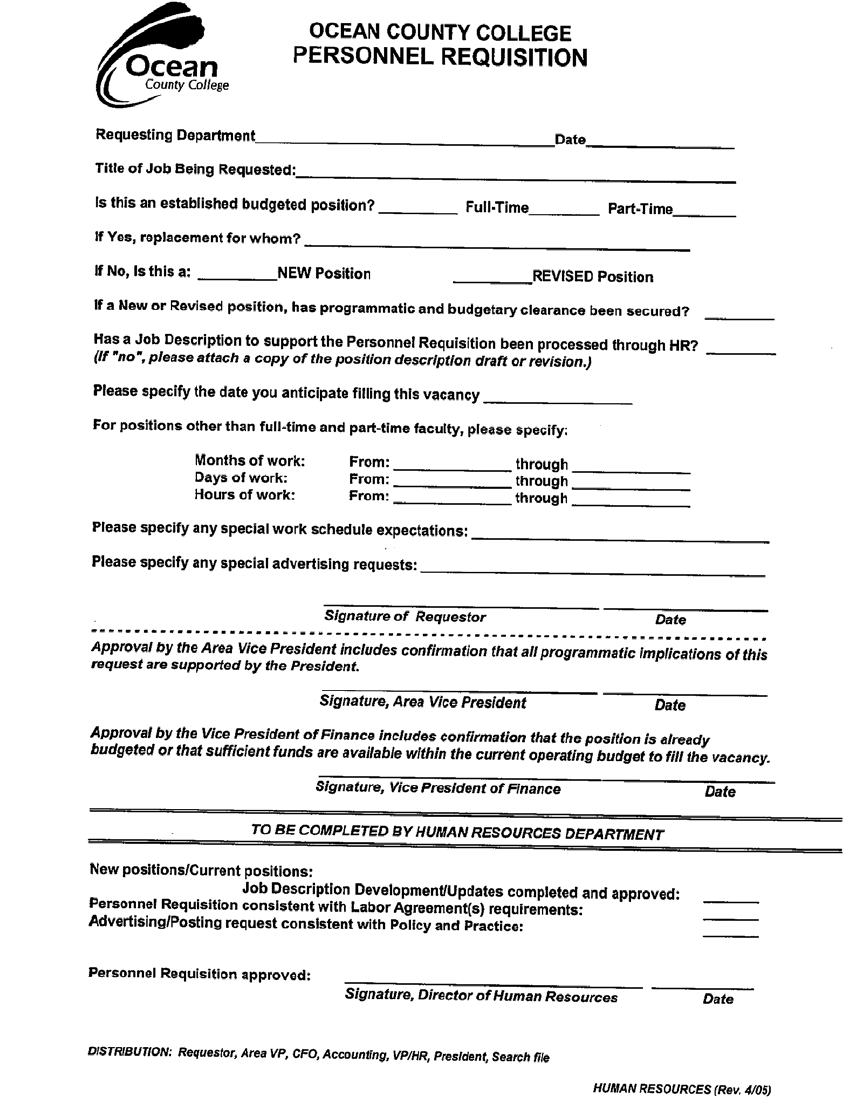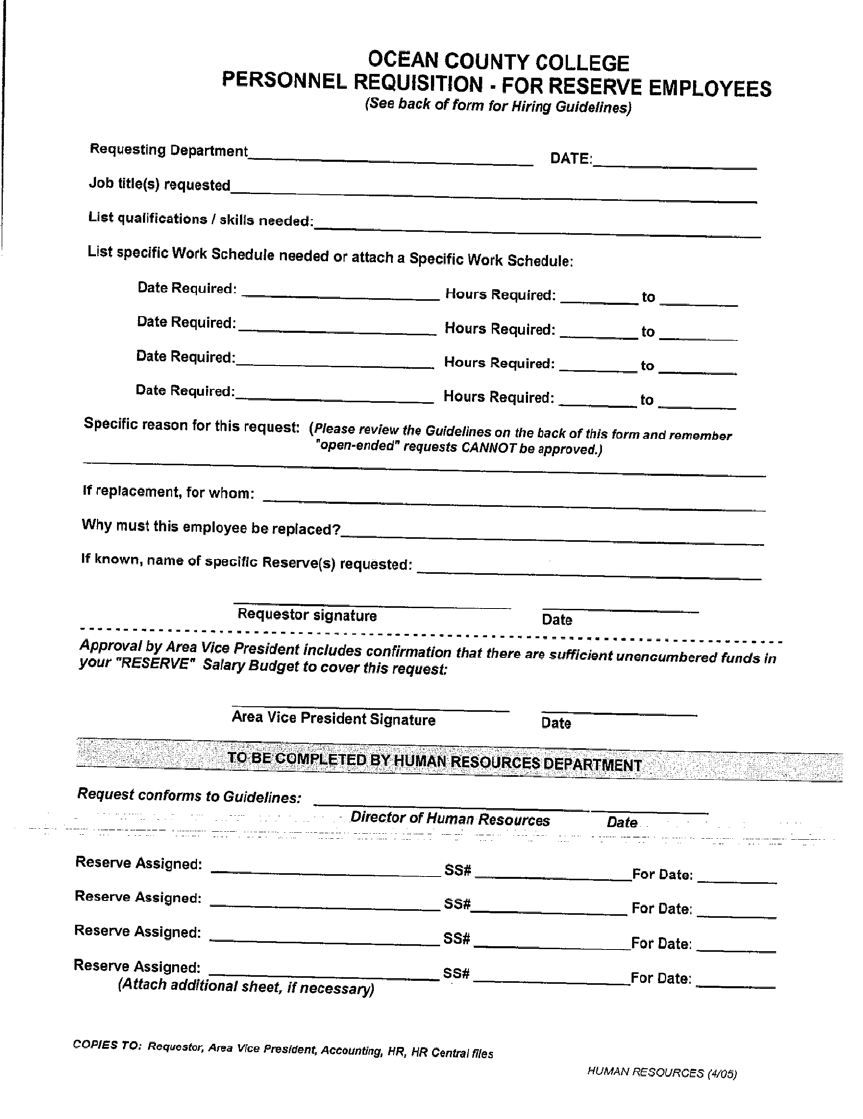
HUMAN RESOURCES HIRING
MANUAL FOR OCEAN
COUNTY COLLEGE
March 2006

2
INDEX of CONTENTS
Job Openings……………………………………………………………………………3
Personnel Requisition Form…………………………………………………………….4
Personnel Requisition Form—for Reserve Employees…………………………………5
Position Vacancy Announcements……………………………………………………...6
The Role of the Human Resources Department………………………………………...8
The Role of the Hiring Department………………….………………………………….9
Applicant Interview Summary Sheet……………………………….……………..…...11
Interviews………………………………………………………………….…..………12
Pre-Interview Responsibilities………………………………...……………..12
The Pitfalls of Interviews…………………………………………………….13
The Golden Interview Rules…………………………………………………15
Interview Questions………………………………………………………….15
Considerations………………………………………………………………..17
Ending the Interview…………………...…………………………………….17
Post-Interview Considerations………………………………………………………..18
Appendix I: Guidelines for Appointing Academic Coordinators……………………..19

3
GENERAL: JOB OPENINGS
y Permanent: When a position is vacated that needs to be refilled or when a new
position based on need is created, an OCC Personnel Requisition Form is required.
y Temporary: To add staff on a temporary, “as need” basis due to a special need, an
OCC Personnel Requisition—for Reserve Employees is required.
y Considerations: Whenever a position becomes available, determine the following:
1. Full time or part time?
2. Permanent or temporary?
3. Funding source (outside or college)?
4. Bargaining unit affiliation, if any, and applicable contractual considerations?
5. Time frames for position availability?
6. Any special schedules or needs?
The Human Resources Department can assist you in the above areas.
The following forms can also be found on the college Web site under FORMS.

4

5

6
POSITION VACANCY ANNOUNCEMENTS
y A Position Vacancy Announcement (or a job posting) is the official notice that a
position is available at Ocean County College (OCC). It contains the information
itemized below, created from the information on the personnel requisition form.
y Distribution: These notices may be sent to job banks, minority groups, county
colleges, state employment agencies, web sites, publications, newspapers and/or
college bulletin boards. The OCC web site also contains all posted job openings.
y A Transfer Notice is a position announcement for a job that is available only to
employees in the unit to which the position is assigned. When a position is
announced as a Vacancy (see above), anyone can apply for the position.
Position
The position is the job title for the available job. Usually the title is self explanatory –
such as Administrative Assistant, Security Guard or English Instructor. Sometimes the
title does not directly explain the position. In order to understand what the position
entails, the duties and responsibilities should provide that information.
Work Schedule
When possible, a work schedule is included so that an applicant can determine if he/she
can work the hours and/or days of the job which are outside a normal work schedule. For
some jobs, such as teaching positions, it is not possible to identify a schedule because
teaching schedules depend upon classes assigned and course enrollments.
Hiring Wage
Many positions have a set wage while others have a range. When possible, a salary is
published so that an applicant has as much information about the job as possible. The
salary assigned to a job can be based on several factors or combinations of factors. These
factors include negotiated salaries as per labor agreements, unit affiliations, number of
hours per week, available budgeted dollars, and outside funding sources.
Application Deadline
A vacancy announcement may be posted internally at OCC for five days prior to outside
advertisements. To expand a pool of applicants or to recruit from outside, an external
announcement usually extends for a ten day period. At the top of the position vacancy is
a date to indicate when the job was announced. Each announcement also indicates a
deadline date for applying for the position.
Duties/Responsibilities
Major duties describe in general terms what the person will be doing in the position but
the list of duties cannot list everything an employee will do. For example, a major

7
general duty may state that the position requires the maintenance of files. In specific
terms, the person will be responsible for alphabetizing, counting, organizing, reviewing
and analyzing information but the job description will not indicate all these steps; nor will
it identify all the files by name or category. A general statement is used to give the
applicant an awareness of what is expected.
Qualifications
The qualifications are either the required or preferred education, training, experience,
special skills and/or knowledge a person needs in order to be qualified to perform the job.
The qualifications posted and the qualifications of the applicant are used as a guide to
identify those who may or may not be able to perform the duties of the position. A
qualification cannot be both required and preferred; it must be one or the other. If there
is one position and several qualified applicants, generally the most qualified is offered the
position. The individual selected should have the skills or experience that make him/her
the best qualified for the job.
College Information
Each job announcement includes the college’s mailing address, web site, fax number and
specific email address. These provide applicants with a variety of ways by which to
submit their employment information. Information can also be hand delivered to the
Human Resources Department.
It is important to remember that applications and resumes are officially received in the
Human Resources Department. If an individual applies directly to another department,
the application and the envelope in which it was mailed must be forwarded to the Human
Resources Department immediately so it can be recorded as received. If it is not
properly forwarded and logged in by the Human Resources Department, the applicant
can not be considered for the position. All advertisements and job vacancy
announcements indicate that resumes/applications are to be submitted to the Human
Resources Department.

8
THE ROLE OF THE HUMAN RESOURCES DEPARTMENT
y Advertising: The Human Resources Department is responsible for deciding which
sources to use for advertising, ad layouts, and designation of time frames. The hiring
department is always welcome to submit input as to where and when to advertise.
Final advertising decisions made in HR are based on availability, special recruitment
resources, cost effectiveness, time factors and target populations.
y All applications, resumes and credentials are collected in the Human Resources
Department. Having one location to which information is submitted controls the
receipt, monitoring and maintenance of applicant information. All position
announcements will direct applicants to forward their information directly to the
Human Resources Department – either by email, in person or via US mail.
In the event that a department/member receives a resume/application in the mail,
through email, or hand-delivered, the application should be forwarded immediately to
the Human Resources Department. The department will respond to the applicant if
necessary, providing accurate information concerning both the availability of the
position and anything else the applicant may need to know.
y Deadline dates for receiving employment information are important. These define
the date by which applicants must submit their information to the college in order to
be considered a timely applicant.
Deadline dates will be enforced in the Human Resources Department. In the event
that one exception is made, all late applicants will be included in the potential file
that is sent to the department to consider. Exceptions can be made for situations
noted as emergencies, such as: The loss of a data base file, the expansion of a pool of
applicants, an error in an announcement/advertisement, or like circumstances.
y Transmittal of Applications to Departments: Shortly after the deadline date, the
hiring department will receive applicant information as follows:
1. For support and non-professional positions, the Human Resources Department
will be responsible for reviewing the announced qualifications and those of the
applicants. The pool will be distributed in three files. The first file will contain
those individuals who meet and exceed the required and preferred qualifications.
The second file will contain those individuals who meet the required
qualifications. The third file will include those who appear to be unqualified for
the position based on the information submitted/received.
2. For professional positions, the hiring department will receive all applications in
alphabetical order to review.
NOTE: When the appropriate software is acquired,
applications will also be electronically evaluated.
3. The hiring department will also receive a spreadsheet of information
indicating the applicant’s name, address, and other pertinent data.

9
THE ROLE OF THE HIRING DEPARTMENT
See also the OCC Search Committee Hiring Manual for full process details.
y Establish a Search/Hiring Committee: Each hiring committee must have a
committee chairperson. The chairperson is responsible for selecting the committee
members who should be knowledgeable about the position and able to provide input
into the preparation of interview questions. They must also be available for the
interviews that are arranged.
y An Affirmative Action Representative who has been certified by the Human
Resources Department as having been trained must serve on each search committee.
(Training will occur several times per year in a group setting or, upon occasion,
individually.) The purpose of the representative is to monitor the legality of questions
asked and to report any actions/discussions that take place during the interviewing
process that deviate from the norm. Any deviations or abnormalities are to be
reported immediately to the college’s Affirmative Action (AA) Officer.
y Number: There is no set number of committee members. The chairperson may select
as few as two or may decide to have a larger number of committee members to help
with the interviewing process. Some labor agreements provide direction as to who
may/must be included. The chairperson should put together a committee that is a
good cross-section of the college population and may not exclude anyone because of
age, race, gender, or other protected categories.
y Orientation of Committee: The chairperson is responsible for arranging for the AA
Officer to meet with the committee to provide a summary of the hiring process and to
answer any questions. At that meeting, the committee will be provided with
additional forms that need to be completed during the search process. The meeting
generally takes about 20 minutes.
The Charge to the Committee
Following the meeting with the AA Officer, the Committee has three major jobs to
complete.
y The first is to prepare and agree upon the questions to be asked of all applicants in
the interview. Information on the do’s and don’ts of interviewing/questions are listed
later in this document. The chairperson is responsible for submitting the questions at
least two days prior to the interviews to the Affirmative Action Officer for approval,
emailed to [email protected]
. The questions will be reviewed for compliance and
validity. Each question will be approved, disapproved or changed and will be
returned to the chairperson as soon as is possible. The AA Officer’s response to the
vetted questions should be returned with all the applications when the committee is
finished with the interviews and makes its recommendation(s).

10
y The second main responsibility of the search committee is to review all the
applications received and decide on who should be interviewed and who should
not. Required qualifications for the position and the qualifications of each applicant
must be evaluated. This is a team effort.
Each applicant file must contain a completed “summary sheet”. This summary
validates why an individual was interviewed or not interviewed. The form is self
explanatory and may be found on the following page. This form should be returned
to HR in the applicant’s file when the committee is finished with the interviews and
makes its recommendation(s).
y The third main responsibility is to interview job candidates and make
recommendations (see Interviews
, pp. 12-17, ff).

11
Applicant Interview Summary Sheet*
Name of Applicant_________________
Position Interviewed For: ______________________ Date Of Interview: ___________
Interview Summary
Did not meet all required qualifications on job description
(please identify at least one qualification that was not met)
Met all required qualifications on job description
Met all required qualifications on job description and also
brings the following preferred skills/experience (identify)
(Check one)
Was Interviewed
Was Not Interviewed
Summarize Strengths And Weaknesses
Results of Interview (If Interviewed)
Recommended as finalist #_________
Do not recommend hiring
Other (explain)
_________________________
________________________
Committee Chair Date Initials of committee Members
*Attach this form to the front of each application.
Male
Female Unknown
W
B
H/L
AA Info:
AI/AN
A/PI UN

12
INTERVIEWS
Pre-Interview Responsibilities
y The committee will designate a block of time for interviewing. All members must
be available.
y A location for the interviews will be designated. The location should be
comfortable, conducive to an interview, and free of telephones or other interruptions.
y A committee member or other designated person should make all the arrangements
for interviews. When arranging interviews, the responsible person should tell the
applicants the following:
1. The interview is for a position at Ocean County College located in Toms River,
New Jersey;
2. The title of the position;
3. The name and number of the person to contact if the applicant has a problem in
attending the scheduled interview;
4. The time the interview will be held;
5. The location of the interview (building location and room number);
6. The location of parking facilities;
7. Whether or not the applicant needs to bring anything to the interview (e.g.: a
driver’s license or other required credential, for committee verification);
8. The approximate length of the scheduled interview;
9. Whether or not the interview will include any phase other than questions/answers
(example: writing, Power Point presentation, or other job-related activity );
10. The location of the college and the fact that directions to the college can be found
on the college’s web site, www.ocean.edu
NOTE: If applicants indicate that they require a special accommodation
, inform them
that the Affirmative Action Officer will contact them in reference to their request. Please
ask them what accommodation is being requested. Do not evidence surprise or shock, but
do explain that it is the college’s procedure to arrange accommodations requests through
the AA Officer to insure that a proper accommodation is made. Special accommodations
can be requested and approved for eligible disabilities but judgments require expertise in
accordance with the Americans with Disabilities Act. For this reason, the AA Officer will
handle all requests of this nature. Please contact Karen Blyskal, AA Officer, at extension
2096 immediately following the conversation with the applicant to relay the applicant’s
name and number. The AA Officer will be responsible for arranging such interviews for
the committee and for providing the appropriate accommodations.
y Once interviews are arranged, the committee should keep in mind any potential
unforeseeable circumstance. For instance, if an interview is arranged for the
following week and prior to the interview there is the prediction of a major winter
storm, the appointment might be rescheduled or the interviewee called the day before

13
to inform him/her how to find out whether or not the interview is still on. Don’t
assume that anyone unfamiliar with the college’s operations will anticipate college
closings. Lasting impressions—both good and bad—can be made on applicants
based how the college staff communicates with them, even before the actual
interview.
The Pitfalls of Interviews
y Don’t deviate from established procedures or questions in an effort to be creative.
y If thoughts of maybe not, possibly not, could be a problem or don’t, pass through your
mind, you probably shouldn’t.
y In today’s world, even the best planned interviews open up a world of liability in the
arena of labor law. Discrimination, violations of state and federal laws, and invasion
of privacy are only a few of the perceptions that can result from an interview.
y Questions that are poorly prepared, bear no relevance to the position, seek
information which is not related to the job, and/or small talk that solicits information,
as well as downright illegal questions all open an employer to potential problems.
y Review the following scenarios and keep an open mind in deciding whether or not
they should or should not be part of the interviewing process If you decide they
should not be, indicate why.
Scenario 1
One of the requirements for the position is a Bachelor’s Degree. The applicant
graduated from University of West Haven, Connecticut. You ask the applicant if he took
any classes at Yale because the two schools are in the same vicinity. Is this okay?
No, because the perception is that Yale is an Ivy League College and "better" than West
Haven. If the candidate has the appropriate degree, s/he has met the criterion.
Scenario 2
The applicant appears ready for the interview but one of your committee members
has just left the room for a few minutes. The applicant, feeling uncomfortable with the
silence, tells you s/he can’t believe what s/he heard on the radio in reference to a
statement made by a politician. What’s your response?
You don't want to engage in any conversation which can be perceived as biased or
controversial in nature – and politics usually is. Never forget: Anything that is said
before, during and after the interview is considered to be "on the record". Better to
change the subject and just pass the time with some information as to the format of the
hiring process and the time anticipated - something factual that won't matter with one of
the committee members out of the room.
14
Scenario 3
During the interview, the applicant is asked if s/he has ever coordinated a number
of projects at the same time. S/he indicates s/he has four children below the age of eight,
is a single parent, is the sole caregiver for a sick parent, can cook up a storm, and often
has trouble paying the bills. What should you do?
Repeat the question and ask the applicant to answer in response to work projects to get
him/her back on track. If you allow him/her to ramble, s/he is technically discussing
issues such as marital status, medical information, and financial issues. S/he could
potentially say later that s/he was discriminated against because of marital status,
medical information, and financial issues – all of which have nothing to do with his/ her
ability to do the job.
Scenario 4
During the interview the applicant says s/he doesn’t feel well and would like to
take a few minutes to get a drink of water. Do you allow him/her to leave?
Yes.
Scenario 5
One of the questions you are approved to ask is whether or not the applicant has the
required driver’s license for the position. The applicant responds that s/he has a license
from another state. A member of the committee then asks, “Can’t you get one in New
Jersey?” What do you do?
Before the person can respond, one of the committee members should say: “ Please don't
answer that question. The question needs to be rephrased. We meant to say that one of
the qualifications required is a NJ license due to (the insurance that we carry - or
whatever the reason may be). We see you have one from Pennsylvania. Would you be
willing to obtain a license from New Jersey?”
Scenario 6
The position you are searching for is a switchboard operator and the requirement
for the position includes a clear speaking voice. It is almost impossible to understand the
answers from the interviewee. What should you do?
Continue the interview as best you can and be sure that you provide no indication to the
person that s/he has/does not have the job. If you don't understand an answer you can
ask the person to repeat the answer. You cannot ask the interviewee about a speech
impediment or about his/her speech mannerisms. You should indicate on the interview
summary sheet that the person did not have a clear speaking voice as required for the
position.
Scenario 7
You have scheduled “Randy” for an interview as a mechanic. When “Randy”
appears, you are not quite sure whether Randy is male or female. Should you ask?

15
Absolutely not; you should go through the interview with this person in the same manner
as you did for all other applicants.
Scenario 8
You are interviewing for a supervisory position and need someone with
experience in a warehouse. The applicant states that he worked at ABC Company for
twenty years but that the company went bankrupt two years ago and there is no way you
can verify his employment. You previously worked there five years ago. Should you let
the applicant know that?
You can state the fact that you worked at ABC five years ago. If in fact the company did
close, you can ask the interviewee to bring in a pay stub to verify that s/he worked at
ABC two years ago or ask for the W-2 form.
Scenario 9
The current opening is for a Math Instructor and requires a Master’s Degree from
an accredited College/University. Janet Jones has been called in for an interview and you
have requested that she bring her transcripts with her. She appears with a transcript for
Janette Johnson. What can you ask her about this?
You may note the difference in the names and ask if she can provide the documentation to
indicate that she is the same person whose name appears on the transcript.
The Golden Interview Rules
y Have a legitimate business reason to support any questions asked of job
candidates or any job requirements that are established. Keep all inquiries and
requirements job related.
y No conversation during the interview is “off the record.” Be careful of “small
talk,” even that of individuals not directly involved in the interview process. This
includes the receptionist who may encounter an applicant as s/he waits for the
interview to begin. The receptionist should not discuss personal matters or ask any
potentially illegal questions, as exemplified in this document.
Pre-Employment Questions that Cannot Be Asked
y Have you ever been treated for drug addiction or alcoholism?
y Have you ever filed for workers’ compensation insurance?
y Are you taking prescription drugs?

16
y Do you have any disabilities or impairments that may affect your performance in the
position for which you are applying?
y Do you have any physical defects that preclude you from performing certain kinds of
work? If yes, describe such defects and specific work limitations.
y How many days were you absent from work last year due to illness?
y Have you had a major illness in the last five years?
y Are there any health-related reasons you may not be able to perform the job for which
you are applying?
y Have you ever been treated by a psychiatrist or psychologist? If so, for what
condition?
y Have you ever been hospitalized? If so, for what?
y Have you ever had or been treated for any of the following conditions or diseases?
y Have you been treated in the past three years for any conditions or diseases, and if so,
what were they?
Questions That Can Be Asked in an Interview
y Can you meet the requirements of the attendance policy?
y Can you perform the tasks of this position with or without an accommodation?
y Describe or demonstrate how you would perform this function, with or without an
accommodation.
y Do you use illegal drugs?
y Do you have the required licenses and degrees to perform this job?
What Needs To Be Considered When Interviewing
y Disabilities
y Discrimination
y Confidentiality

17
y Invasion of Privacy
y Employment Practices
y References
y Physical Exams
y Drug Tests
Ending the Interview
y When the committee has finished the interview, applicants should be asked if they
have any questions. If they do, be honest when you answer; however, never make a
job commitment at this point. If you don’t know the answer and it is a good question,
assure the person you will get them an answer. If it is an irrelevant question, tell the
applicant that you believe it is not related to the job.
y The applicant should be informed as to the next step of the process. Will there be
additional interviews? If yes, identify approximately when.
y You should also ask the applicant, if pertinent, how much notice they need to give a
current employer if they are offered the position. Some companies require very little
notice while other employers require a lengthier, designated time
y Time frames: If you have an idea as to when the interviewing process will be
completed and a final decision will be made, you can tell the applicant that you
expect to have a final decision by a specific date. Suggestion: Always add another
week to the time period in case of unforeseen delays. Make it clear that applicants
are notified in all cases as to the disposition of their application. If your decision is
going to take a long time, let them know that. An honest and accurate answer
provides applicants with a point in time at which they will know if they have the job
or not. Realize that waiting for an answer is often filled with anxiety and can be
stressful. Being honest and setting real deadlines helps to alleviate these problems.
y Thank applicants for coming into the interview, regardless of whether the interview
went well or not. Ask them if they need directions to leave the campus. Be pleasant.
y The Committee should discuss the strengths and weaknesses of the interview as
soon as possible following its conclusion and collectively summarize the results on
one interview summary sheet. All members should agree. If there is agreement
between all, one sheet can be completed and all members will initial it at the bottom.
If one or more members disagree with the remainder of the committee, each one may
complete a separate summary sheet and attach it to the application for final review

18
and consideration. Committee members may contact the AA Officer with any
concerns they have experienced during the process.
Post-Interview Considerations
y Committee members are responsible for reviewing all their notes and then the
committee, as a team, will recommend a #1 candidate. For professional positions,
three
recommended candidates are preferred, but not required. Professional positions
may require an interview at the Presidential and/or Vice Presidential level before a
final decision is made.
y The Affirmative Action Representative is responsible for assisting the committee
chair with compiling the paperwork and statistics that are submitted with the
recommendation to hire.
y All statistical information must be reported for both the applicant pool and for those
interviewed.
y The recommended hires should be placed on top, followed by the remaining
applicants in alphabetical order.
y The entire applicant pool and the recommendations to hire are then returned to
the Human Resources Department for review.
y If the submitted file is approved, Human Resources will calculate a starting salary
and forward the information for additional approvals.
y When all approvals are received, the Head of the Hiring Department will be notified.
y The candidate will be contacted and offered the position.
Developed: Spring 2006

19
APPENDIX I: Guidelines for Appointing Academic Coordinators
While each academic department has selected academic coordinators in approximately the same
manner over the history of the college, it seems useful to summarize this process to insure equity
and fairness. As a result, as of September 1, 2007, the selection of all academic coordinators at
the college will follow these guidelines.
Assignment Availability: Coordinator assignments will become available under the following
circumstances:
y The resignation, retirement, termination, or death of the existing coordinator;
y The establishment of a new coordinator assignment.
Work Responsibilities: Work responsibilities and released-time allotments will be reviewed
regularly by the Department Dean and updated as necessary. Changes will be recommended by
the Vice President of Academic Affairs (VPAA) and forwarded to the President for approval.
Any change in released time hours must
be negotiated. Following any approved substantive
change in the work responsibilities and any negotiated changes in released time, the Dean will
copy the Human Resources Department, circularize all faculty members in the coordinator’s
discipline for information purposes and keep a record of the circularization.
Filling a Coordinator Appointment: Existing coordinator work responsibilities will be
circularized to department faculty in advance of the appointment deadline for a new coordinator.
The opening will also be posted on the college’s web site. Should no full-time faculty member
meet the qualifications or seek the position, the Dean is free to seek qualified applicants outside
the full-time faculty members in the discipline.
Letters of Interest: Faculty members or other qualified personnel who wish to express interest
in being coordinator and who meet the minimum qualifications will write a letter to the Dean of
the department in which the coordinator’s discipline resides. The letter must be given to the Dean
by the deadline date stated in the posting.
Appointment: The Dean will speak informally with all qualified persons who express interest in
working as a coordinator, select a candidate from among those who submit a letter of interest, and
make his/her recommendation for this candidate to the Vice President of Academic Affairs
(VPAA). Full time faculty will be given preference. The VPAA will accept or reject the Dean’s
recommendation and forward the name of the accepted candidate to the President for final
approval and recommendation to the Board of Trustees.
Terms: Unless otherwise indicated, terms of academic coordinators will begin on September 1
of each academic year and end on August 31 of the following year.
Reappointments: Whenever possible, the Dean will recommend reappointment of the existing
coordinator, with the coordinator’s concurrence, for the subsequent academic year at the June
Board of Trustees meeting. Coordinator reappointments are annual and may be withheld at the
discretion of the President. There is no tenure in the coordinator position and coordinators may
be terminated at any time for cause.
Developed: Summer 2007
